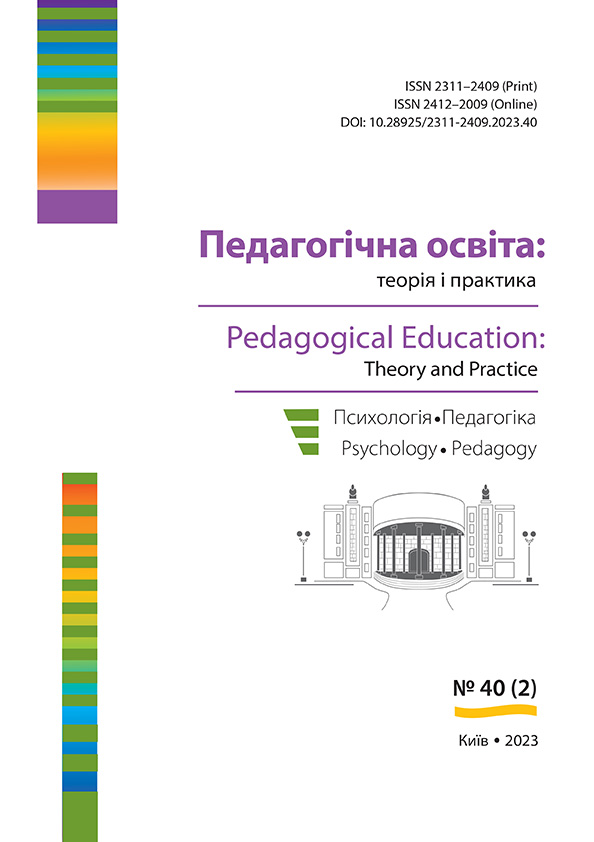Challenges and risks of implementing innovative practices in higher education of Ukraine.
DOI:
https://doi.org/10.28925/2311-2409.2023.4010Abstract
. The article deals with the introduction of innovative practices in Ukraine, their feasibility in higher education, challenges and risks that cause both progress and decline in higher education. The authors emphasize the need to introduce innovative resources in the field of adult education, because it is in the current crisis conditions that innovative digital resources are created. It is determined that the purpose of this article is to reveal the effectiveness of the implementation of innovative practices as an important object of development of higher education in Ukraine. The task is to study innovative practices: the challenges of today, the feasibility of application and avoidance of risks that could lead to the decline of higher education; review of the advantages and disadvantages of artificial intelligence resources: Gamma, ChatGPT. The authors characterize the peculiarities of the concepts of "innovation" and "innovative practices" aimed at ensuring quality education for higher education students in today's crisis conditions, in particular, full-scale invasion and lack of electricity. The author analyzes the feasibility of introducing innovative practices of the twenty-first century, which include applications of artificial intelligence, for example, Gamma, ChatGPT. The author emphasizes that higher education in Ukraine is significantly influenced by the European space, since education is based on the European-type structure, and, accordingly, the learning process is on the way to mastering them. It is found that the adult education system in European countries is imperfect, the biggest problem is ensuring quality teacher training, which should be given sufficient attention, since the basis of qualitative education is highly qualified specialists. In conclusion, the author emphasizes that the preservation of the intellectual potential of the nation in the difficult conditions of the twenty-first century, characterized by the challenges of society, depends on the introduction of innovative practices in higher education in Ukraine.
Downloads
References
Терещенко Г. В. Інноваційний фактор у контексті моделей розвитку регіонів. Ефективна економіка 2012. № 12. Посилання: http://www.economy.nayka.com.ua/?op=1&z=1661
Дубасенюк О.А. Інновації в сучасній освіті. Інновації в освіті: інтеграція науки і практики: збірник науково-методичних праць 2014. С. 12-28.
Швидун В. М. Інноваційні процеси в освіті України. Педагогіка формування творчої особистості у вищій і загальноосвітній школах. 2022. № 81. С. 87-90.
Ганечко І., Афанасьєв К. Інноваційні проєкти та штучний інтелект: нові можливості. Проблеми
та перспективи розвитку інноваційної діяльності в Україні: виклики воєнного часу. 2023.
С. 155-157.
Яцюк Д. Чи може Chat GPT замінити людський інтелект. 2023. С. 151-152.
Річард Фішер. Як ми ледь не знищили самих себе. 2021. Посилання: https://www.bbc.com/
ukrainian/vert-fut-56904731
Огієнко О. Інноваційний розвиток освіти дорослих як вимога сучасності. 2019. С. 20-22.
Посилання: https://pedscience.sspu.edu.ua/wp-content/uploads/2021/01/%D1%82%D0%BE%D0%
BC-1.pdf
Горпинич О. В., Сало В. О. Європейська система забезпечення якості вищої освіти: досвіт
та механізми її імплементації в Україні. 2013. С. 286-294. Посилання: https://ir.nmu.org.ua/bitstream/
handle/123456789/150207/286-294.pdf?sequence=1
Желанова В.В., Козир М.В. Використання ІКТ і медіаресурсів студентами-філологами в освітньому процесі ЗВО: моделі й стратегії. // Збірник наукових праць «Педагогічна освіта: теорія
та практика. Психологія. Педагогіка.» Випуск №38 (2/2022) С. 44-50. https://pedosvita.kubg.edu.ua/
index.php/journal/article/view/345
Козир М., Іващенко А. Цифрові технології як інструмент консультативної діяльності в освіті дорослих. // Збірник наукових праць «Педагогічна освіта: теорія та практика. Психологія.
Педагогіка.» Випуск №39 (1/2023) С. 73-79 Режим доступу: https://pedosvita.kubg.edu.ua/index.php/
journal/article/view/365
Tereshchenko H. V. Innovatsiinyi faktor u konteksti modelei rozvytku rehioniv. Efektyvna ekonomika
[Innovative factor in the context of regional development models. Effective Economy] 2012. No. 12. Link:
http://www.economy.nayka.com.ua/?op=1&z=1661 [in Ukrainian]
Dubaseniuk O.A. Innovatsii v suchasnii osviti. Innovatsii v osviti: intehratsiia nauky i praktyky: zbirnyk
naukovo-metodychnykh prats [Innovations in modern education. Innovations in education: integration
of science and practice: collection of scientific and methodological works]2014. P. 12-28. [in Ukrainian]
Shvydun V. M. Innovatsiini protsesy v osviti Ukrainy. [Innovative processes in the education of Ukraine.
Pedagogy of creative personality formation in higher and secondary schools]. 2022. No. 81. P. 87-90. [in
Ukrainian]
Hanechko I., Afanasiev K. Innovatsiini proiekty ta shtuchnyi intelekt: novi mozhlyvosti. Problemy ta
perspektyvy rozvytku innovatsiinoi diialnosti v Ukraini: vyklyky voiennoho chasu. [Innovative projects
and artificial intelligence: new opportunities. Problems and prospects of the development of innovative
activity in Ukraine: challenges of wartime.] 2023. P. 155-157. [in Ukrainian]
Yatsiuk D. Chy mozhe Chat GPT zaminyty liudskyi intelekt [Can Chat GPT replace human intelligence].
P. 151-152
Richard Fisher. Yak my led ne znyshchyly samykh sebe. [How we almost destroyed ourselves]. 2021.
Link: https://www.bbc.com/ukrainian/vert-fut-56904731 [in Ukrainian]
Ohiienko O. Innovatsiinyi rozvytok osvity doroslykh yak vymoha suchasnosti. [Innovative development
of adult education as a modern requirement]. 2019. P. 20-22. Link: https://pedscience.sspu.edu.ua/wpcontent/uploads/2021/01/%D1%82%D0%BE%D0%BC-1.pdf [in Ukrainian]
Horpynych O. V., Salo V. O. Yevropeiska systema zabezpechennia yakosti vyshchoi osvity: dosvit ta
mekhanizmy yii implementatsii v Ukraini. [The European system of quality assurance of higher education:
education and mechanisms of its implementation in Ukraine]. 2013. P. 286-294. Link: https://ir.nmu.org.
ua/bitstream/handle/123456789/150207/286-294.pdf?sequence=1 [in Ukrainian]
Zhelanova V.V., Kozyr M.V. Vykorystannia IKT i mediaresursiv studentamy-filolohamy v osvitnomu
protsesi ZVO: modeli y stratehii. [Use of ICT and media resources by philology students in the educational
process of higher education: models and strategies.] // Zbirnyk naukovykh prats «Pedahohichna osvita:
teoriia ta praktyka. Psykholohiia. Pedahohika.» Vypusk №38 (2/2022) S. 44-50. Link: https://pedosvita.
kubg.edu.ua/index.php/journal/article/view/345 [in Ukrainian]
Kozyr M., Ivashchenko A. Tsyfrovi tekhnolohii yak instrument konsultatyvnoi diialnosti v osviti
doroslykh. [Digital technologies as a tool of advisory activities in adult education.] // Zbirnyk naukovykh
prats «Pedahohichna osvita: teoriia ta praktyka. Psykholohiia. Pedahohika.» Vypusk №39 (1/2023) S. 73-79
Link: https://pedosvita.kubg.edu.ua/index.php/journal/article/view/365 [in Ukrainian]

